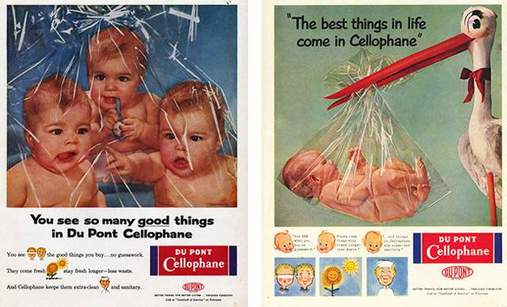 Vintage DuPont Ad Vintage DuPont Ad Through an economist's lens, I have seen the way the winds blow for a while now. One of the insights that got me into the field was that capitalism is a hungry beast that has prowled its way across the globe through predatory and destructive means for two centuries. This definitely was not taught at schools of economics across this country... quite the contrary, neoclassical economics (as ordained by J.P. Morgan himself) was conveniently put in place as the holy grail at the most lauded schools, especially in the northeast. The language of history is very revealing, and it will never fade from my mind that colonialism is the mechanism by which "the core feeds from the periphery." How very beastly. And indeed, colonialism (in service of capitalism) has and continues to do just that. As the decades marched on, however, and fewer and fewer civilizations remained at the "periphery," the appropriation continued in more insidious ways. Britain may no longer have military running India, the great Trail of Tears may no longer be marching in America, South Africa may no longer have official apartheid, but colonialism is alive and well. How can it not be, so long as free-market capitalism is alive and well? A quick refresher. Neoclassical economics holds three assumptions:
So, as I am sure you can glean from just this cursory overview, there are some serious problems with these assumptions. But first, let's review how these came to be. Modeling, in any field, includes assumptions. We may wring our hands and cry foul, but in the end, any mathematical or logical model that is created to predict future outcomes MUST have constraints... otherwise, we'd be looking at thousands upon thousands of possible variables that would quickly bog us down in a quagmire.. in other words, we would just be re-creating the reality we are living. And if we could not figure things out living in actual reality, what good does it do us to try and figure things out in a model of virtual reality? Secondly, these assumptions, which were barely refined over two centuries, were devised in a very different time and a very different world: a world without the telephone, radio, television, and now the internet. So the very idea that consumers have complete and relevant information is based on such a vastly different set of quantifiers that we have a hard time understanding the actual intended meaning of this statement. Lastly, we must address the one industry that was created strictly to serve capitalists and that has arisen to conquer capitalism and the consumer in just the last 100 years: advertising. Informing, persuading, marketing, and, more recently, psychiatry (or social science) and big data, are all evolving outgrowths of an effort to ensure that the consumer has "complete and relevant" information. However, this spectrum that reaches through time and cultural shifts from informing back in the nineteenth century all the way through to data collection used today is broad and duplicitous. What we must not lose sight of is that one of the founding principles of free-market economics, that people are self-serving, greedy, and inherently competitive, is still accepted today in many neoclassical economics schools, and, thus, in corporate boardrooms, on Wall Street, and in the political realm. This is not by coincidence. An adaptation of Darwin's survival of the fittest, this assumption looks to the idea that evolution is fueled by the elimination of those those too weak to "win" the procreation race. And so, the evolution of a product, service, business, or industry dictates that it's qualities compete with its rivals. Every advancement is an effort to survive, to win. Of course, this type of competitiveness engenders cut-throat tactics and savvy ingenuity. This used to result in innovation, but that has changed. No longer are production decisions made primarily to better the product or to "maximize its utility" to the consumer. Indeed, most producers no longer put the majority of their resources into improving their products. No need. We have advertising. Over the last 60-70 years, industry has moved from selling products that aim to maximize utility to the consumer, to simply maximizing satisfaction of the consumer. In other words, the ad industry has succeeded in shifting resources from producing the most competitive product to producing the most competitive illusion of satisfaction, contentment, happiness, self-perception... of dopamine. While products still need to deliver on the general expectations of utility, they no longer have to necessarily compete based on our “rational value preferences.” It is now simply a matter of providing us with a sense of self-worth. It is not about what the product does for the consumer, it is how the consumer feels when they buy it. This is true of every sector, every product, every service, every endeavor… even charitable activities meet their triumph or failure based on how donors feel, and not necessarily based on whether the work they do has value. So what does any of this have to do with capitalism, social and economic collapse, and humanity’s downfall? Oh, were you under the impression this was an economics lesson? No, no… this is just background intelligence to prepare you for the reality check. This, ladies and gentlemen, is about how climate change is a direct result of environmental degradation, which is a direct result of hyper-consumerism. And why do we consume far beyond our needs? Why do we consume things that we throw out and replace almost immediately? Why do we consume things that can never be made to “go away?” You got it, because we were made to believe these equal happiness and self-worth. We are talking about climate change so vast and precipitous, that it is poised to take down every institution, cultural norm, political structure, and sense of humanity with which we identify. Yet advertising and marketing strategies continue the push to sell products whose resources are irreplaceable and unethically sourced, whose distribution carries a vast carbon footprint, whose off-gassing is making us sick, and which will not biodegrade in thousands of years. Or, worse yet, which will bio-degrade into a form more invasive and deadly than we ever anticipated (like micro-plastics). Why has this incredibly fast and exhilarating ride been so impossible to slow down, much less stop? Many environmentalists and activists shake their heads, confounded by the sheer political and social “UNwill.” The push back when activists point out the huge environmental catastrophe that factory farming has become, the election of a president who can get away with rolling back climate initiatives, the blasé reporting of red algae blooms along hundreds of miles of the Florida coast that killed everything in the water and made people sick… these are all indicative of a nearsightedness that seems incomprehensible to some of us. And yet, it is all rather predictable when the veil of free-market capitalism is cast aside and the inner workings of industry, corporations, and financial institutions are examined. When the revolving door between pharmaceuticals and government spins perpetually, when banks are bailed out for their crimes only to repeat them, when wages stagnate below poverty levels while the top 1% accumulates an exponentially increasing amount of wealth, this is when bubbles burst. And the collapse of financial markets is only the first step in the total collapse of humanity, according to Dmitry Orlov, author of The Five Stages of Collapse. I recently read a social media post of an encounter a mother of a sick toddler had with a healthy grown man in a Walmart the day a “boil your water” warning was issued in Austin this past October. There was no shortage of water, there was electricity, the roads were open, emergency services were up and running, public transportation was functioning, there was food on the shelves of every store. The ONLY thing that was going on was this “boil your water” notice. The man had piled up his shopping cart with excessive bottled waters, while the mother of the sick toddler had none… the shelves were bare. She politely asked the man if he would share a case with her. His response: “f**k off”. This same man might have opened the door for her the day before, might have donated $5 to charity at checkout the day after. But at that moment, all sense of community was severed. Commercial, political, social, and cultural collapse had just occurred between these two humans. Their faith in the market, their faith in government, their faith in neighborliness, and their faith in humanity had been shaken. All five stages of collapse occurred between these two people on a day when a “boil your water” notice was issued. Can you imagine what will occur nationwide when there is an actual collapse of any of these sectors? The question I therefore lay before you is not, “how do we prevent these sectors from failing?” because, as has been established, there are no breaks on this ride. But rather, I pose this question: “when these fail, what are the most important things to know and do?” Because it is now no longer a matter of “if” but “when” and “how.” This is not an essay on prepping. This is not an essay on bugging out. This is not an appeal to eat less meat. This is an invitation to enter the first stage of grief. Grief over the impending doom of human culture as we know it. Because, only once we get to the last phase of grief, acceptance, can the real work begin. The work of Deep Adaptation. The next essay: The Work of Deep Adaptation.
1 Comment
Leave a Reply. |
AuthorI've reached the half-century mark... I don't take myself very seriously any longer. I would say you shouldn't either, but saving humanity from her folly is a serious business, after all. Archives
March 2023
|

 RSS Feed
RSS Feed
